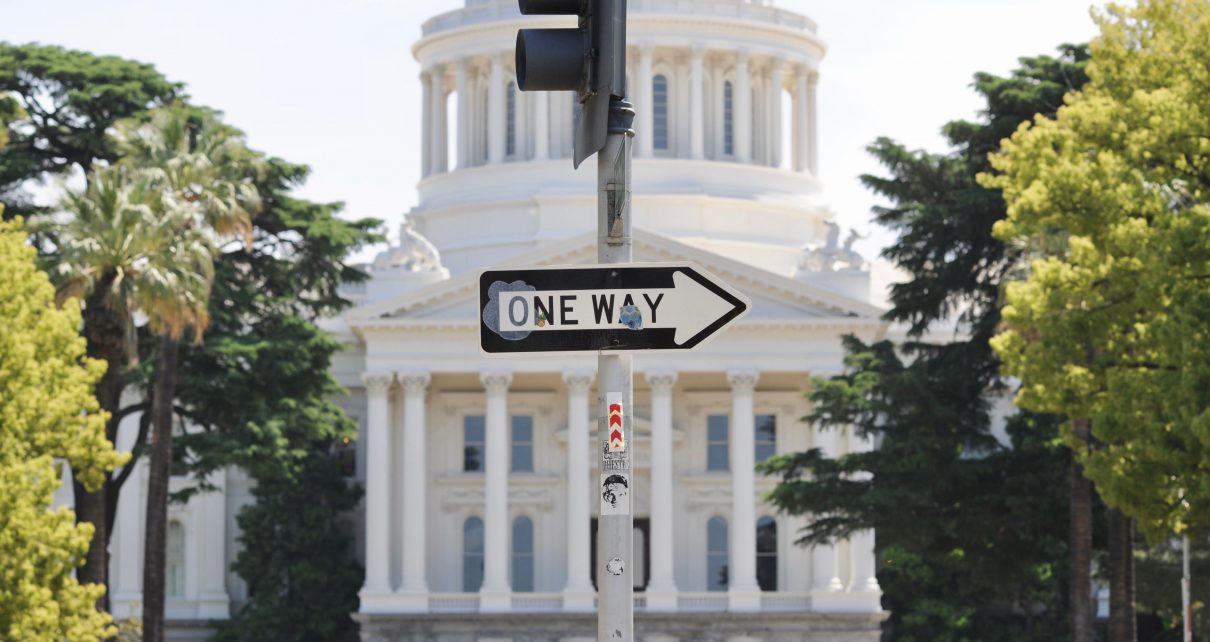
California State Capitol - One Way. (Photo: Kevin Sanders for California Globe)
California Was Just Named One of the Worst Judicial Hellholes in the Nation – Again
Frivolous ‘no injury’ lawsuits continue to thrive in California costing taxpayers millions
By Katy Grimes, December 9, 2022 11:43 am
California was named one of the worst “Judicial Hellhole®” in the country again, according to a new report from the American Tort Reform Association.
“Uninjured serial plaintiffs file hundreds of meritless lawsuits targeting businesses, and ultimately, plaintiffs’ lawyers are the only people benefiting from the state’s unbalanced civil justice system,” Judicial Hellholes reports.
“California is plagued by serial plaintiffs and their lawyers who file boilerplate, no-injury lawsuits that nitpick technicalities and abuse the legal system,” American Tort Reform Association (ATRF) President Tiger Joyce said. “Unfortunately, while trial lawyers often collect millions, their clients may receive mere pennies.”
California employers are being targeted and financially crippled by frivolous lawsuits filed under PAGA, the Private Attorneys General Act. PAGA is a unique California law that allows aggrieved employees to file lawsuits against employers for even a small or accidental violation of California’s more than 1,100-page labor law digest, Tom Manzo, the founder of the California Business and Industrial Alliance (CABIA) reported at the Globe. These lawsuits, while lucrative for the state’s trial attorneys, often cost businesses thousands, if not millions, in settlement and legal fees.
ATRF says the law was intended to protect workers, but instead it’s created a system so stringent that work environments are forced to operate in strict adherence, meaning employees actually lose flexibility in their work lives.
PAGA was enacted in 2003 to allow employees to sue employers for violating provisions of the California Labor Code and collect civil penalties, the Globe reported.
In February 2021, Assemblyman Heath Flora (R-Ripon) attempted to address California’s Judicial Hellhole with AB 385, to make an important change to the Private Attorneys General Act (PAGA) statute, the Globe reported. AB 385 was never even given a hearing, killing it. The bill would have provided much-needed relief to businesses facing litigation during COVID-19 by amending the Labor Code Private Attorneys General Act (PAGA) so that an employee who files a civil claim that is subject to an arbitration agreement may not pursue a PAGA claim where the employer voluntarily chooses not to enforce the arbitration agreement, the CalChamber reported.
The Judicial Hellholes® report cites Proposition 65 as another favorite tool of the state’s trial bar – a law unique to California which originally intended to protect consumers from harmful chemicals.
“Prop-65 has become so expansive that its warnings are practically meaningless to consumers, now,” Joyce said. “While it may be comical to see things like a door handle in California claim to be a possible carcinogen, it can be especially burdensome for small businesses without the in-house expertise or means to add the necessary warnings or handle the very real litigation and costs that result from this out-of-control law. The money companies spend on compliance and litigation unnecessarily drives up the cost of goods for all California consumers.”
This year to date, California businesses have settled 611 claims and paid out $13.9 million, with plaintiffs’ lawyers receiving 88.2% or $12.2 million, ATRF reports.
The Globe spoke with Victor Gomez, Executive Director California Citizens Against Lawsuit Abuse, about the latest California Judicial Hellhole designation. Gomez, who at age 25 opened a pizza franchise, says California’s trial lawyer lobby has already spent $35 million in television and radio ads promoting lawsuits against employers in California. They may end up at $70 million in air time ads for legal services by the end of the year Gomez said. And he noted that the lawyers make far more than the plaintiffs in these cases.
Accessibility lawsuits are one litigation arena in which serial plaintiffs are filing no-injury lawsuits. California is home to more than half of the nation’s accessibility lawsuits, ATRF reports.
“Opportunistic and predatory trial lawyers target mom-and-pop shops with few financial resources, and specifically small-business owners who speak English as a second language,” ATRF’s Joyce said. “While the trial bar has plenty of alarming tactics, preying on immigrant-owned businesses who may not fully know the ins and outs of the U.S. legal system is especially egregious.”
Gomez shared the experience Crema Coffee Roasting Company in San Jose has had being targeted by predatory trial lawyers over accessibility. He said the owners, Vietnamese immigrants, were sued by one of the most notorious predatory accessibility lawyers in the state. The owner, June Tran, said she couldn’t afford to make the front staircase accessible to physically disabled customers, and ended up closing the beloved coffee company, SanJoseInside.com reported. Tran reached out to the plaintiff to not only find out what didn’t work for him, but to try and work it out outside of court, Gomez said. “The plaintiff wasn’t interested in fixing the issue – he only wanted the lawsuit.”
The Globe has referred to these lawsuits as legal shakedowns of small businesses. As Gomez noted, it’s usually small businesses and mom and pop shops which are targeted because they are low-hanging fruit, and don’t have a powerful lobby to defend them or contribute to elected lawmakers.
California’s penchant for filing no-injury lawsuits is driving up costs throughout the state, Gomez said. “As a small business owner in Central California for 17 years, I have seen too many of my fellow business owners struggling with the expense of trying to respond to claims that are more about making a fast buck on an abusive suit than to right a wrong,” said Gomez.
With inflation costs at an all-time high, Californians pay a “tort tax” of about $2,000 per person each year while nearly 750,000 jobs are lost annually due to excessive tort costs, Gomez said. The Globe asked why the Legislature has not fixed this law, and why every year California features prominently on this report.
“The supermajority party is accepting so many contributions from the trial lawyers,” he said.
The American Tort Reform Foundation says the 2022-2023 Judicial Hellholes® report also cites increased abuse of the state’s lemon law, climate change litigation, novel COVID-19 liability, and expanding consumer protection liability as additional reasons for the state’s ranking.
ATRF makes sure to note that California’s drop in the rankings from last year’s No. 1 spot has nothing to do with progress made in the state, but instead is a reflection of how poorly things are going in other states’ civil justice systems.
With no legislative fix on the horizon, Gomez said the Fair Pay Employer Accountability Act will be on the 2024 ballot. “If the Legislature isn’t going to do anything, we will take it to the voters,” Gomez said.
The California Chamber explains the importance of the Fair Pay Employer Accountability Act:
The ballot measure will put workers’ labor claims back in the hands of the independent regulator, getting their claims handled faster without having to hire trial lawyers that drag out the process and take a third of their settlements. This initiative will also help small businesses around California that have been defenseless against shakedown lawsuits while ensuring willful violators will be fined double the penalties.
“We are excited to take this measure directly to the voters who will vote to empower the Labor Commissioner instead of continuing to line the pockets of some unscrupulous trial attorneys,” said Jennifer Barrera, president and CEO of the California Chamber of Commerce. “We are positive that when voters learn more about how these bad actors have taken advantage of PAGA, leaving workers with less money, they will vote yes on this reform.”
The 21st edition of the annual report published by ATRF names eight Judicial Hellholes® in total, deemed the most unjust local courts and state civil justice systems in the country:
1. Georgia
2. The Supreme Court of Pennsylvania and the Philadelphia Court of Common Pleas
3. California
4. New York
6. South Carolina Asbestos Litigation
7. Louisiana
8. St. Louis
The full report is available at JudicialHellholes.org.
- Governor Newsom ‘Stands in Solidarity’ with Central Valley Child - December 12, 2024
- ‘Jobs are Down and Workers are Suffering’ While Gov. Newsom Touts Job Increases - December 11, 2024
- Sacramento Mayor Darrell Steinberg’s Career: A Fractured Fairytale - December 11, 2024




Great — California near the top spot in EVERY SINGLE THING that is negative, draining, and destructive!
What a nightmare. And it seems this is has been going on FOREVER. Not exactly a cheery holiday thought.
But THANK YOU Katy for publishing this – we need to be aware of the ENEMIES in our midst so that we can figure out how to FIGHT AGAINST them (via peaceful means, of course)… but resist we must…
And it’s becoming apparent that political activism is a must for the conservative side, as the other side is engaged in it full-time… and they’re bankrolled by evil globalists like $oro$, who wishes to destroy American liberty and freedom…
No wonder businesses and residents are leaving California.
The “accessibility” complaint was used by a serial plaintiff and her attorney against Clint Eastwood several years ago. But, unlike the Crema Coffee Roasting Company owner, Eastwood had the money and time to fight back; and won the case in court. These serial plaintiffs and their attorneys have to be stopped.
@Raymond This happened to a local company in Santa Cruz County as well and I think they closed down because of it.
@Angela G, yes, I agree with Ms. Grimes’ description of this type of lawsuit as a “legalized shakedown”, extortion from business owners. These serial plaintiffs and their attorneys have taken a law that was meant to be for “consumer protection” and turned it into a means of personal profit.
Thanks, Katy. I was not aware of this list. I’m not surprised California is near the worst. Glad to hear there will be a ballot measure to try to bring back some sanity.
@Raymond This happened to a local company in Santa Cruz County as well and I think they closed down because of it.
They just have to make everything about race! Everything is NOT ABOUT RACE! IF IMMIGRANTS GET MPNEY FROM OUR GOVERNMENT TO BUY A BUSSINESS THEY SHOULD GET MONEY FROM THE GOVERNMENT AND GO TO SCHOOL TO LEARN THE BUSSINESS LAWS. HELL YOU WHITE AMERICAN CITIZENS ARE THE ONLY ONES BEING DISCREMINATED AGAINST! DISCRIMINQTION LAWSUITS ARE THE ONES THEY SHOULD CHANGE THE LAWS ABOUT BEING ABLE TO HOLLER DISCRIMINATION CAUSE IM BLACK OR MEXICAN OR WHATEVER AND SUE AMERICAN CITIZENS OVER!! ENOUGHS ENOUGH WITH THE CÀUSE IM BLACK BULLSHIT!! WE NEED LAWS FOR THE WHITE AMERICAN CITIZENS AND WHY DOESNT OUR GOVERNMENT GÌVE US FREE CARS, FREE MANSIONS, AND FREE BUSSINESS?
You sound stable.
Small business defense lawyer here: All 3 of one of my family clients’ hotels were hit by the same BS accessibility lawyer. Gave us a $1k settlement discount on the 3rd one and an apology. Been defending a frivolous male discrimination case for over 2 years. Settlement demands have been well into six figures from the beginning despite maximum statutory damages of $16k. He actually said “Sorry. It’s the tail that wags the dog.”
Wow. And the hits just keep on coming…